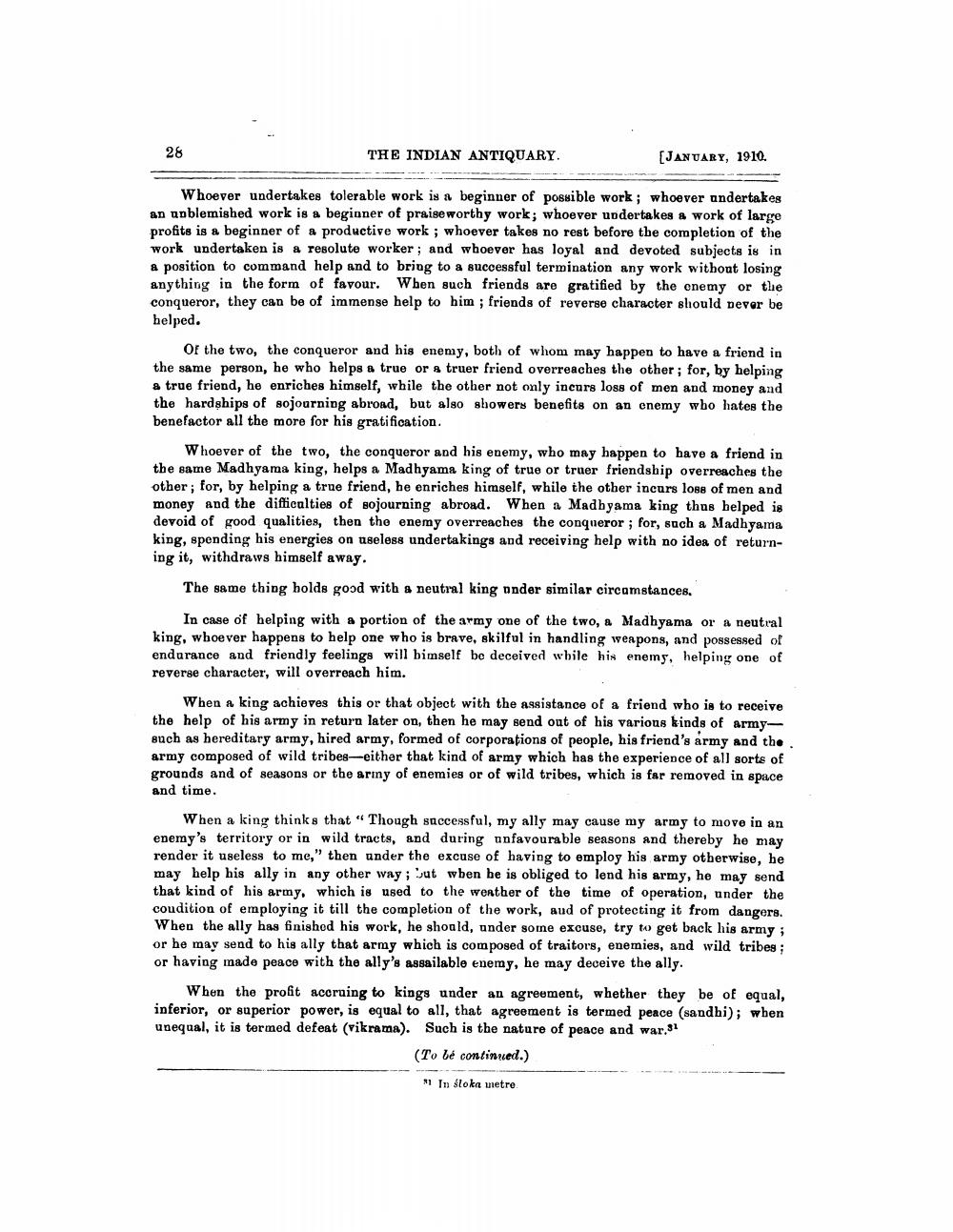________________
28
THE INDIAN ANTIQUARY
(JANUARY, 1910
Whoever undertakes tolerable work is a beginner of possible work; whoever undertakes an apblemished work is a beginner of praise worthy work; whoever undertakes a work of large profits is a beginner of a productive work ; whoever takes no rest before the completion of the work undertaken is a resolute worker; and whoever has loyal and devoted subjects is in a position to command help and to bring to a successful termination any work without losing anything in the form of favour. When such friends are gratified by the enemy or the conqueror, they can be of immense help to him ; friends of reverse character should never be helped.
Of the two, the conqueror and his enemy, both of whom may happen to have a friend in the same person, he who helps a true or a truer friend overreaches the other; for, by helping a true friend, he enriches himself, while the other not only incurs loss of men and money and the hardships of sojourning abroad, but also showers benefits on an enemy who hates the benefactor all the more for his gratification.
Whoever of the two, the conqueror and his enemy, who may happen to have a friend in the same Madhyama king, helps a Madhyama king of true or truer friendship overreaches the other; for, by helping a true friend, he enriches himself, while the other incurs loss of men and money and the difficulties of sojourning abroad. When a Madhyama king thus helped is devoid of good qualities, then the enemy overreaches the conqueror; for, such a Madhyama king, spending his energies on useless undertakings and receiving help with no idea of returning it, withdraws himself away.
The same thing holds good with a neutral king under similar circumstances.
In case of helping with a portion of the army one of the two, a Madhyama or a neutral king, whoever happens to help one who is brave, skilful in handling weapons, and possessed of endurance and friendly feelings will bimself be deceived while his enemy, helping one of reverse character, will overreach him.
When a king achieves this or that object with the assistance of a friend who is to receive the help of his army in return later on, then he may send out of his various kinds of armysuch as hereditary army, hired army, formed of corporations of people, his friend's army and the army composed of wild tribes-either that kind of army which has the experience of all sorts of grounds and of seasons or the army of enemies or of wild tribes, which is far removed in space and time.
When a king thinks that "Though successful, my ally may cause my army to move in an enemy's territory or in wild tracts, and during unfavourable seasons and thereby he may render it useless to me," then under the excuse of having to employ his army otherwise, he may help his ally in any other way; ut when he is obliged to lend his army, he may send that kind of his army, which is used to the weather of the time of operation, under the condition of employing it till the completion of the work, aud of protecting it from dangers. When the ally has finished his work, he should, under some excuse, try to get back his army ; or he may send to his ally that army which is composed of traitors, enemies, and wild tribes; or having made peace with the ally's assailable enemy, he may deceive the ally.
When the profit aceruing to kings under an agreement, whether they be of equal, inferior, or superior power, is equal to all, that agreement is termed peace (sandhi); when unequal, it is termed defeat (Vikrama). Such is the nature of peace and war.31
(To bé continued.)
N1 In Sloka metre




